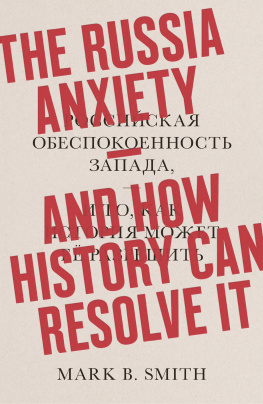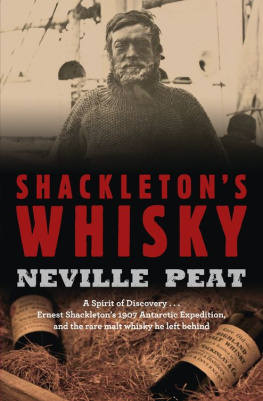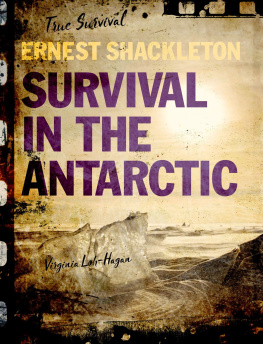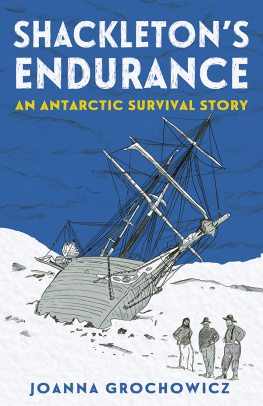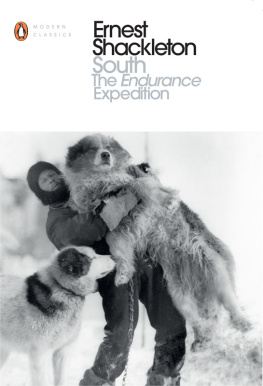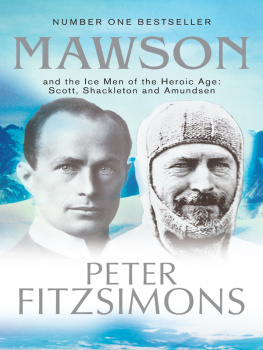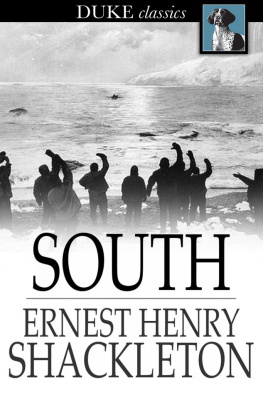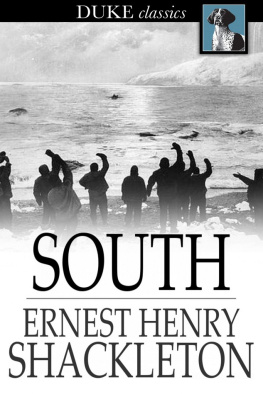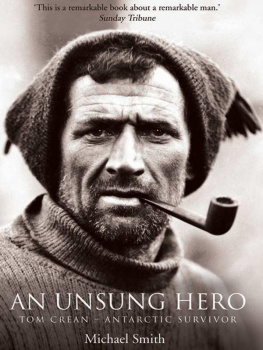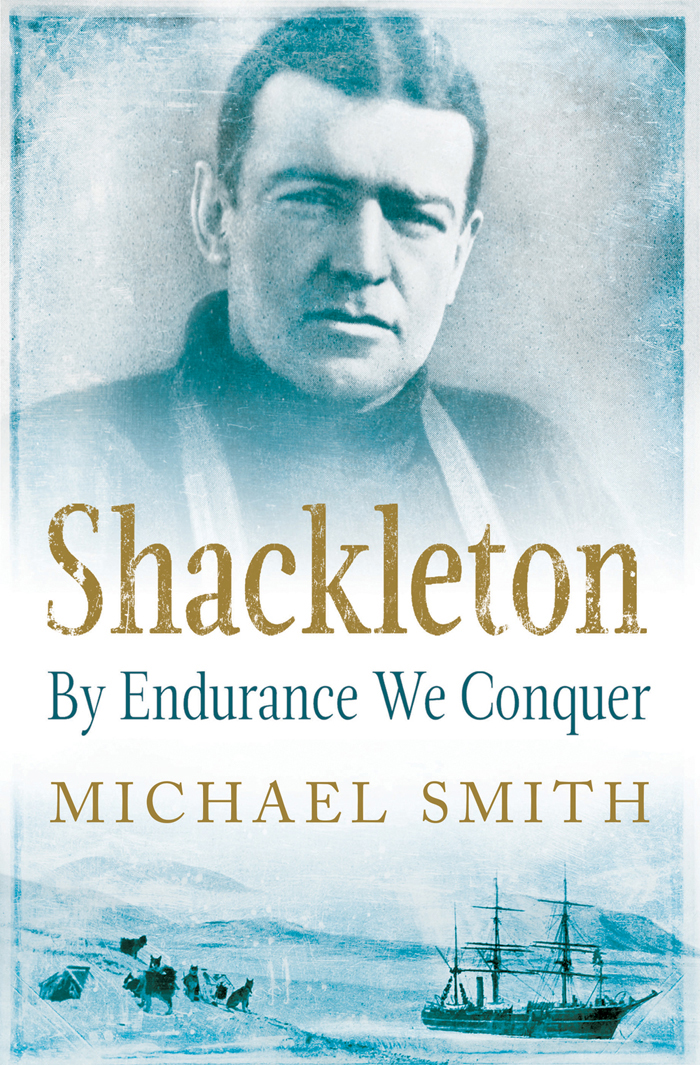Shackleton
By Endurance We Conquer
Also by Michael Smith
An Unsung Hero: Tom Crean Antarctic Survivor
I Am Just Going Outside: The Tragedy of Captain Oates
Tom Crean Ice Man: The Adventures of an Irish Antarctic Hero
Polar Crusader: A Life of James Wordie
Shackleton The Boss: The Remarkable Adventures of a Heroic Antarctic Explorer Captain Francis Crozier: Last Man Standing?
Tom Crean: An Illustrated Life
Great Endeavour: Irelands Antarctic Explorers
Shackleton
By Endurance We Conquer
MICHAEL SMITH

A ONEWORLD BOOK
First published in North America, Great Britain & Australia by
Oneworld Publications 2014
This edition of Shackleton: By Endurance We Conquer is published
by permission of The Collins Press, Cork, Ireland, www.collinspress.ie
This ebook edition published by Oneworld Publications, 2014
Copyright Michael Smith 2014
The moral right of Michael Smith to be identified as the Author of this work has been asserted by him in accordance with the Copyright, Designs and Patents Act 1988
All rights reserved Copyright under Berne Convention
A CIP record of this title is available from the British Library
ISBN 978-1-78074-572-5
eISBN 978-1-78074-573-2
Oneworld Publications
10 Bloomsbury Street
London WC1B 3SR
England
Stay up to date with the latest books,
special offers, and exclusive content from
Oneworld with our monthly newsletter
Sign up on our website
www.oneworld-publications.com
To Barbara, Daniel, Nathan, Lucy and Zoe
Contents
T his book arose from a lifelong interest in the history of polar exploration and it would be impossible to thank everyone who has helped me over the years. Some have long since passed away, though their assistance, guidance and sound advice will never be forgotten.
Equally, it would be impossible to thank all the archives, libraries, museums and personal collections I have benefited from over the years to inspect many records, papers and photographs relating to polar history. I am grateful to them all and any omissions are unintentional.
Special thanks must go to: Athy Heritage Museum, Ireland; British Library, London; British Library Newspaper Archive, London; Canterbury Museum, New Zealand; Dulwich College, London; Edinburgh University Library, Scotland; Kerry County Museum, Tralee, County Kerry; Library and Museum of Freemasonry, London; National Archives, London; National Library of Scotland, Scotland; National Maritime Museum, London; Oldham Local Studies & Archives, Lancashire; Royal Geographical Society, London; Scott Polar Research Institute, Cambridge; Alexander Turnbull Library, New Zealand.
I am especially grateful for the help given by: Mervyn Bassett, Beadle, The Skinners Company; Sheila Donaldson, Bingley & District Local History Society; Calista Lucy, Keeper of Archives at Dulwich College; Peter Aitkenhead and Captain David Swain, the Library and Museum of Freemasonry; Del Styan and Alistair Murphy of the Cromer Museum; Angela Heard-Shaw at the Hull History Centre; Aubrey Jones for access to Koettlitz Family Papers.
My thanks go to Alexandra Shackleton, the granddaughter of Sir Ernest Shackleton, who allowed me access to material in the family possession. Jonathan Shackleton was also very helpful and willingly answered my questions. I am very grateful.
Robert Burton has been an enthusiastic and generous source of information about polar affairs and especially South Georgia. Anne Savours willingly shared her voluminous knowledge of polar history. I am hugely grateful to them both.
I must pass on a very special thanks to Seamus Taaffe for generously sharing his knowledge and information about polar history. Thanks must also go to Margaret Walsh at the Athy Heritage Museum for her patient and valued support. Joe OFarrell was a source of wisdom and encouragement for which I am very grateful. I owe a particular debt of gratitude to Richard Green who generously allowed me access to Kilkea House and gave me a fine insight in the place where Shackleton was born. I am very grateful for the much-valued assistance of Dr Jim McAdam. Mary OConnell was a source of inspiration.
I am indebted to Dr Cathy Corbishley for her very valuable help with medical matters. Dr Ursula Rack, Adjunct Fellow, University of Canterbury was especially helpful regarding Felix Knig. Nan Keightley was an important help with my research and I am very grateful.
Charles and Christine Dorman provided useful knowledge of Emily Dormans family. I also appreciate the help given by Rev. Heidi Huntley and Michael Kingston of St Bartholomews Church, Sydenham. I was also given generous assistance by Angie Butler on Frank Wild and by Helen Carpenter on John Quiller Rowett. Walter Hodder was generous with his understanding of the Dorman family connection with Wadhurst.
Thanks are also due to the following for sharing their knowledge on a variety of matters: Ulf Bakke; Mike Barry; Caroline Bone; Con Collins; Arthur Credland; Rosemary Fulton-Hart; Eugene Furlong; Richard Graham; John James; Sarah Lurcock; John Mann; Maureen E. Mulvihill; Alistair Murphy; James Nethery; Frank Nugent; Robb N. Robinson; Peter Wordie.
Where possible, I have identified all known sources of material used in this book and provided full accreditation where it can be properly established. Any omissions are purely unintentional and I would be pleased to correct any errors and oversights.
Families play a vital supporting role in producing a book and I am proud and delighted to say that I have received enormous support from those closest to me. Daniel and Nathan, my sons, were always there when I needed them. Lucy and Zoe, my grandchildren, were simply Lucy and Zoe! The help, patience and understanding of Barbara, my wife, has been supreme and I could not have coped without her.
T he original units of measurement for distances, temperatures and weights used at the time have been used in this book. Where appropriate, the modern conversions are shown.
In some cases, distances were measured in both statute and geographic miles. For reference, a statute mile is 5,280 feet (1.61 kilometres) and a geographic mile is 6,080 feet (1.85 kilometres). For the purposes of consistency, distances are given in statute miles and any reference to geographic miles is explained. In both cases, a conversion to the modern metric equivalent is given.
Temperatures are shown in Fahrenheit, the measurement widely used at the time. Approximate conversions to the more modern Celsius scale are shown where appropriate. For reference, water freezes at 32 F (0 C) and 0 F is equal to -18 C. The normal body temperature of 98.4 F is equal to 36.9 C.
Weight measurement is generally shown in the avoirdupois scale common at the time and approximate conversions to metric are shown where appropriate. For reference, 100 lb is equivalent to 45 kilograms and 1 ton is equal to 1,016 kg.
Places names are generally given as they were used in the Victorian/ Edwardian era. The Ross Ice Shelf, for example, is referred to as Great Ice Barrier or simply the Barrier.
The conversion of old money values into an estimated modern equivalent is provided by a formula supplied by the UK National Archives. For reference, 100 in 1900 would have the approximate spending value of 5,800/7,000 today.
The punctuation, spelling and grammar used in original documents are faithfully reproduced, irrespective of the vagaries.




